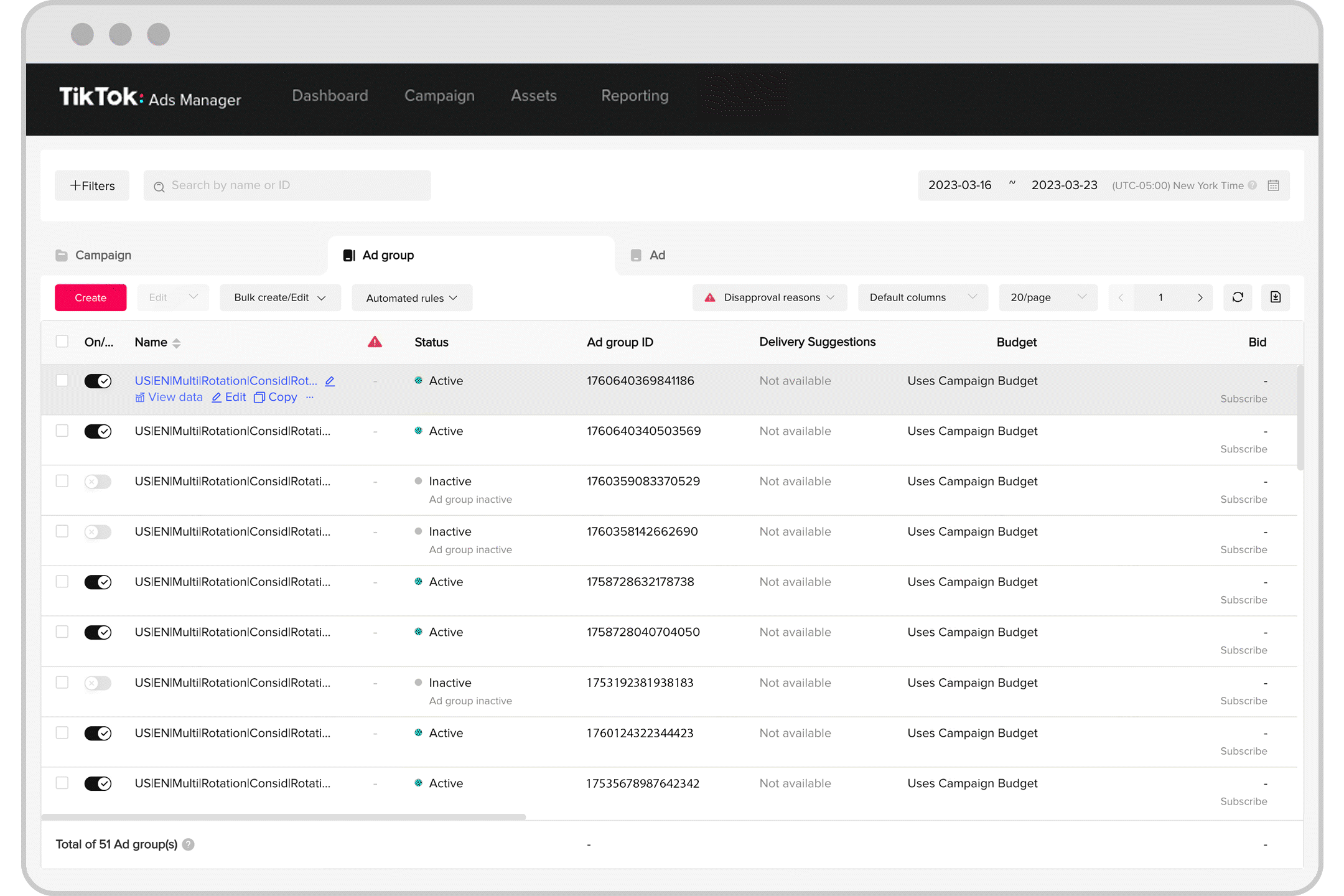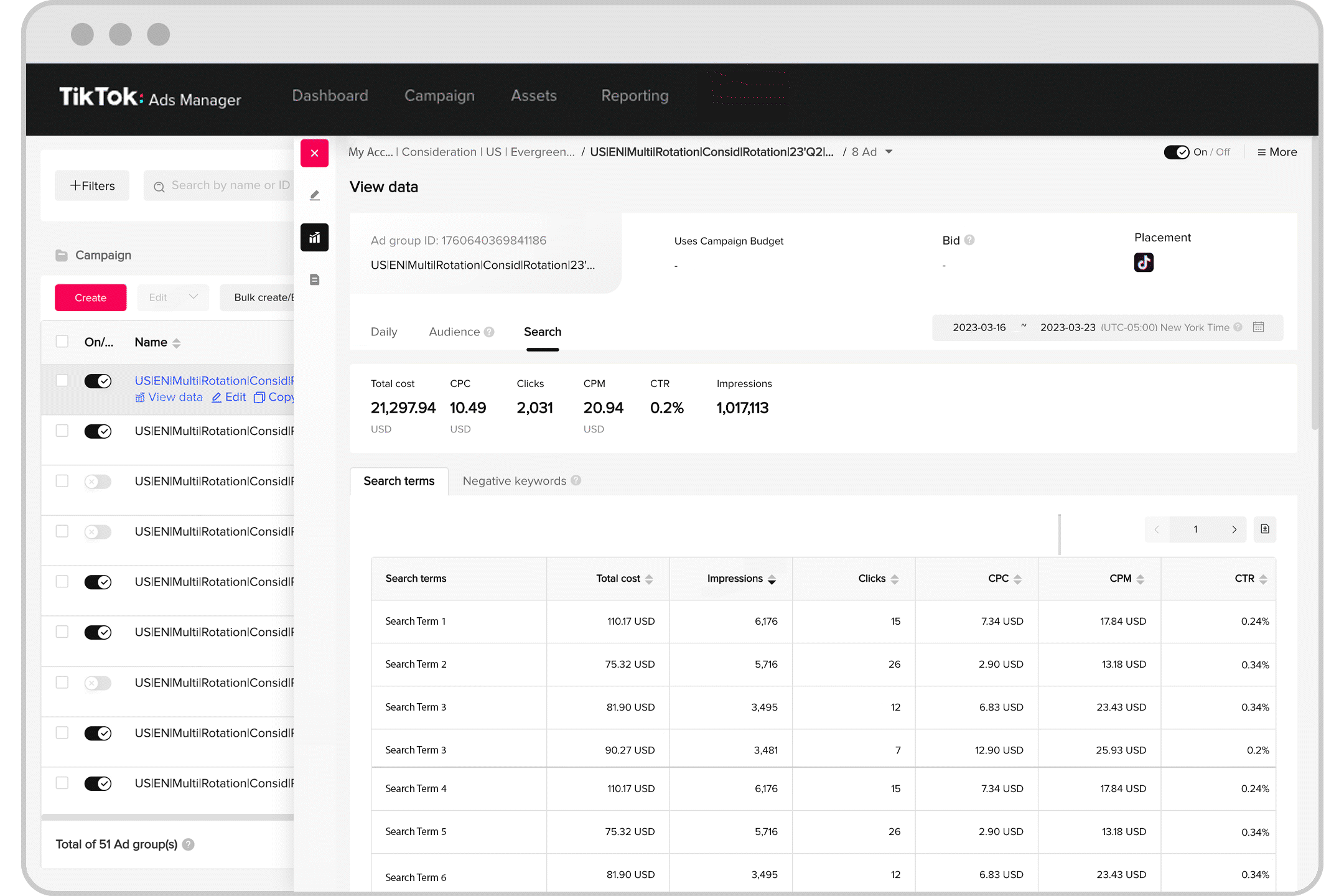Acerca de Automatic Search Placement
El 21 de julio de 2025, se eliminó el control de la interfaz de usuario para el emplazamiento automático de búsqueda. No se ha producido ningún otro cambio relacionado.
El emplazamiento automático de búsqueda (que antes se conocía como opción de Search Ads) amplía tu publicidad in-feed a la página de resultados de la búsqueda de TikTok. Automatic Search Placement te permite llegar a usuarios que buscan algunos términos relacionados con tu producto o servicio. Los Search Ads se mostrarán como contenido “Patrocinado” y aparecerán en diferentes posiciones de la página de resultados de la búsqueda. Automatic Search Placement amplía las campañas de vídeos in-feed y proporciona un emplazamiento adicional para los anuncios dentro de la página de resultados del motor de búsqueda de TikTok. No se trata de los Search Ads tradicionales basados en palabras clave.
Disponibilidad
Plataforma: TikTok Ads Manager
Plan de compra: solo Subasta
País: todo el mundo
Idioma compatible: inglés
Objetivos publicitarios:
Ventas > Sitio web
Generación de iniciativa de ventas
Tráfico
Promoción de la aplicación
Cobertura*
Visualizaciones de vídeo*
Interacción con la comunidad*
*Los anuncios solo se mostrarán en el feed de búsqueda y NO en la página de resultados de la búsqueda.
Las campañas con los siguientes objetivos publicitarios también pueden aparecer en el feed Buscar de TikTok Lite (Japón y Corea) en los países objetivo: Ventas > Sitio web, Generación de iniciativa de ventas, Tráfico, Promoción de la aplicación.
Emplazamiento de Search Ads | Página de resultados de la búsqueda | Feed Buscar |
|---|---|---|
Descripción | Los usuarios ven el Search Ad directamente en la página de resultados de la búsqueda como una miniatura junto a otros resultados de la búsqueda. | Los usuarios acceden al formato de vídeo del feed Buscar haciendo clic en un resultado de la búsqueda y desplazándose a continuación por el feed Buscar. Al desplazarse, existe la posibilidad de que tu anuncio aparezca en el feed Buscar. |
Por ejemplo, supongamos que vendes zapatillas de tenis, y tienes contenido publicitario en TikTok sobre zapatillas de tenis, y que un usuario está buscando zapatillas de tenis. Los Search Ads te ayudan a aprovechar el recorrido de descubrimiento del usuario, ya que se aseguran de que los anuncios pertinentes aparezcan cuando los usuarios buscan términos relacionados con tu negocio. De esta manera, los Search Ads hacen que a los usuarios les resulte más fácil encontrar lo que están buscando y a las empresas, conectar con sus clientes.
Los Search Ads se crean automáticamente usando el contenido y la segmentación de los anuncios de vídeo in-feed existentes y se muestran con las consultas relevantes de los usuarios junto a los resultados de la búsqueda orgánica.
Los usuarios pueden acceder de muchas maneras diferentes a la búsqueda. Una de las formas más destacadas son las pestañas “Para ti” y “Amigos”.
Aquí tienes el recorrido de usuario típico desde la pestaña “Para ti” a la página de resultados de la búsqueda:

Aquí tienes el recorrido de usuario típico desde la pestaña “Amigos”:

Configuración predeterminada
Nota: Cuando crees campañas nuevas, la opción Automatic Search Placement aparecerá activada de manera predeterminada.
No hay garantías de que el emplazamiento automático de búsqueda haga que los anuncios se publiquen en la página de los resultados de la búsqueda de TikTok, ya que hay varios factores que pueden influir en si un anuncio se muestra o no.
El emplazamiento automático de búsqueda hace que se estudie la posibilidad de incluir tu anuncio en el emplazamiento de búsqueda. El sistema de publicación de los Search Ads de TikTok tiene en cuenta muchos factores, como la relevancia de los anuncios para las consultas de búsqueda, los metadatos, los presupuestos, la competencia, etc. a la hora de decidir qué anuncio se mostrará para una consulta de búsqueda concreta.
Funciones e informes
Automatic Search Placement utiliza los ajustes de las campañas de vídeo in-feed y recursos como la segmentación, el presupuesto y los recursos creativos.
Automatic Search Placement amplía de manera automática tu alcance al tráfico de búsqueda utilizando los ajustes y los recursos de tus campañas de subasta in-feed para publicar anuncios en la página de resultados de la búsqueda de TikTok, y puede ampliarlo también a la página de resultados de la búsqueda de TikTok Lite (Japón y Corea) en los países objetivo.
Los informes de TikTok Ads Manager te proporcionan información sobre los términos de búsqueda además de métricas específicas para los Search Ads, como el coste, las impresiones, etc.

Para acceder a los informes, ve a las secciones Informes personalizados y Términos de búsqueda.
Para consultar los informes personalizados sobre el rendimiento concreto de las búsquedas:
Ve a Dimensiones y haz clic en Segmentación.
Selecciona Tipo de anuncio y en Informes, selecciona el informe personalizado que prefieras.
Esta dimensión permite a los anunciantes ver un desglose entre búsqueda e in-feed. Ten en cuenta que no todas las métricas se admiten en los informes de Automatic Search Placement. En el caso de que no se admitan, aparecerán en gris.

Los anunciantes pueden utilizar el informe de términos de búsqueda y los informes personalizados para comprobar el rendimiento de los Search Ads.
Palabras clave negativas
Las palabras clave negativas te pueden ayudar a evitar que se activen anuncios con términos de búsqueda irrelevantes para los anuncios o dañinos para tu marca.
También puedes revisar los términos de búsqueda utilizados para identificar y añadir palabras clave negativas relevantes.

Para obtener más información sobre los tipos de concordancia de las palabras clave negativas, consulta Acerca de los tipos de concordancia de las palabras clave negativas.

